Following Travel Weekly's Hawaii Leadership Forum last month, 12 travel advisors, hoteliers and wholesalers met at the Sheraton Waikiki to discuss Hawaii tourism. Travel Weekly editor in chief Arnie Weissmann moderated the roundtable, which covered a variety of topics, from Maui to vacation rentals to parity between travel advisor commissions and other distribution channels. Here are some of the highlights from that session. (The exchanges have been edited for length, clarity and to keep recurring topics together.)
Arnie Weissmann: To the suppliers: Do you have parity across distribution channels? Is that something that's even possible, given how complex the distribution system is?
Ray Snisky, group president, ALG Vacations: I mean this in the humblest way, as a large player in this space: We have to be a champion for advisors, to champion against disintermediation and let advisors know their value. I said [at the Travel Weekly Hawaii Leadership Forum the previous day] that we have an average 30% positive differentiation between our advisor business and our consumer business. So that's a business that we embrace. We have made a commitment.
Shelly Ransom, senior director member relations, Virtuoso: When you dial in the actual cost of sale across all channels, oftentimes the direct channel costs so much more because you had to do the marketing to find it, you had to do the loyalty program to find it, you have to add so much cost, but you sometimes forget that and only remember the [advisor's] 10% commission, the 15% commission. And certain players ask us to make it different, make it better, make it special for guests. So yes, we ask for marketing, we ask for value-adds, we ask for upgrades. The price may be the same, but the value is so different. And yes, we want parity because we don't want the direct channel to be favored over us. We want to be favored. Do you guys feel pressure from us?
Snisky: I don't look at it as pressure. I look at it as everything's not equal in business. Everyone's not the same. If you can provide higher value, higher revenue, you should be treated differently, you should be compensated.
Jack Richards, CEO, Pleasant Holidays: We have price parity, but we're a performance-based company. So, you sell more, you earn more. Having said that, as Shelly said, there are a lot of people within a consortium -- independent agencies -- that want price parity, and then they want to take it a step beyond. But if they don't perform, they don't get it. We're volume-based and performance-based, and if you're producing, you'll get everything.
Kama Winters, president, Delta Vacations: Across the board, all of our advisor metrics are well above what we get from direct channels. What it comes down to for us is customer choice, right? Customers want to book the way they want to book, and we want to enable that. We need to be able to enable that, and that means that the advisors have to be able to display more of their value. It's not just about parity, right? I think price is a critical point of parity because that's the natural demand lever. But I think there are so many different ways to think about value and how you demonstrate value.
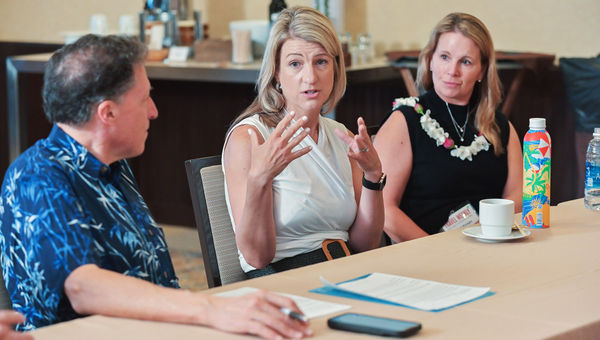
From left, Travel Weekly editor in chief Arnie Weissmann, who moderated; Kama Winters, Delta Vacations; and Melissa Krueger, Classic Vacations. Photo Credit: David Miyamoto
Weissmann: Sean, can you give us some insight on the hotel side?
Sean Dee, executive vice president and chief commercial officer, Outrigger Hospitality Group: We take it really seriously. Look at the data. We track it by property, by channel, every month. And then, to Jack's point on incentives, we actually give bonuses to the revenue management teams based on parity. If they don't achieve at least 90% parity, they actually don't bonus. That's how seriously we take it.
Parity's still important and hopefully yields a better partnership and better results. Still, the consumer wants to book where they want to book, and we've got to be there and make the right offer in the right place at the right time.
Jeff Anderson, co-CEO, Avoya Travel: Parity is very complicated to actually deliver and achieve. But I think if we look at the absence of parity, what does that actually do? I think there are brands that are market makers, and there are brands that are market takers. If there isn't parity, which the consumer would expect -- they don't want to pay more if they go direct, or with any other channels -- what we end up doing when we run into a pricing issue is we do offer to match the price, within supplier policy.
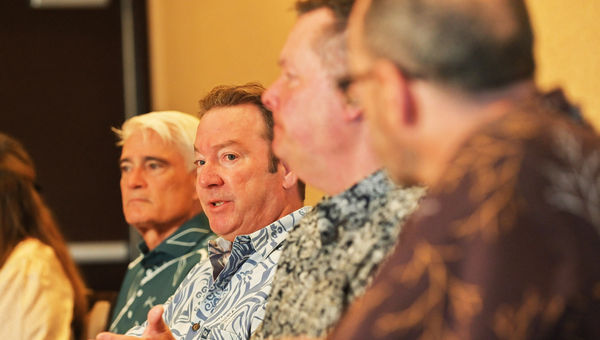
Jay Talwar, Hawaii Visitors & Convention Bureau; Sean Dee, Outrigger Hospitality Group; Ray Snisky, ALG Vacations; and Avi Mannis, Hawaiian Airlines. Photo Credit: David Miyamoto
Weissmann: Following the pandemic, when Hawaii tourism came back, it came roaring back, but then this year, softness has returned. What's your vision for what could be done to rebuild?
Daniel Nahoopii, interim president and CEO, Hawaii Tourism Authority (HTA): There are so many factors. I loved that chart [at the Leadership Forum] that shows that revenge travel is done; we're back to a more constant pace, so we have to adjust to that. There have been so many shifts. Air service has shifted. That's an adjustment. During the pandemic, there was an adjustment in the population. We have to adjust to our marketing targets, too.
Avi Mannis, executive vice president and chief marketing officer, Hawaiian Airlines: One of the things we're thinking about right now is getting back toward the historical equilibrium of domestic versus international visitors. We need to continue to invest in the sorts of things that we need from an infrastructure perspective to manage friction between residents and visitors. That's super important. We have historically invested very little tax revenue generated from tourism back into infrastructure, and that's a big driver of those issues.
Jay Talwar, senior vice president and chief marketing officer, Hawaii Visitors & Convention Bureau: There was a time post-Covid where people were not comfortable flying internationally. Hawaii was the spot [domestically], and we got great yield out of that. Looking forward, it doesn't look like it's going to [continue to be the case].
I think the HTA plays a key role in all of this and is making great strides toward getting dedicated funding again, but at a significantly lower level than it needs to be. It's the lowest it's ever been, in terms of marketing funds. We want to continue making the case that with marketing funds you can find customers, you can increase demand and you can increase yield in the short term. Then, long term, we have to look at infrastructure. Not just lodging, but every touch point of customers, starting at the airports.
Anderson: There is a narrative that happened during Covid, which was that the locals don't want tourists back. And to be honest with you, if I were local, I'd probably feel the same way. The roads are a disaster. This narrative started years ago, and it's going to take a lot to move it.
Mark Stubbert, vice president of member relations, Ensemble: From an advisor perspective, awareness and education are critical. Advisors really need to understand the stories and the value. We're not going to compete on price, but we can compete on value, and that's what advisors try to do every day. But there's so much competition [among destinations], and there's a lack of clarity at the advisor level, wondering, "What's happening? What's going on? Can they handle us?" As we talked about [at the forum concerning] Maui, they don't know. And when they don't know, they won't offer it to clients.
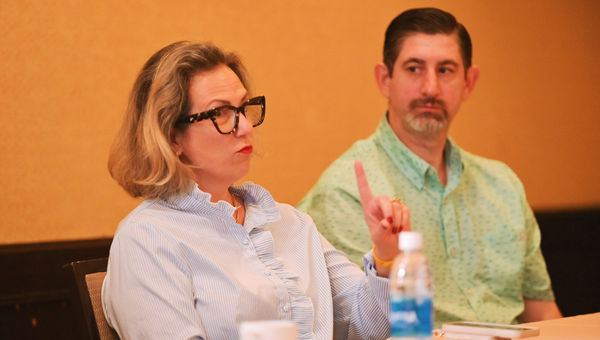
Shelly Ransom, Virtuoso and Danny Genung, Harr Travel. Photo Credit: David Miyamoto
Danny Genung, CEO, Harr Travel: What happened during the pandemic was that my normal Hawaii playbook went out the window. It's gone. I had a lot of people who would have never gone to Mexico, but Mexico was open, and they found some pretty cool resorts down there that were ultraluxurious. And the dollar goes three, four times further than here. Hawaii used to be an easy sale [but customer behavior changed]. Also, all the influencers, all the media, all the shows that were being filmed, that was all happening in the Caribbean and Mexico over the last three to four years.
I think we need to look at the consumer behavior of why somebody goes to Hawaii. We have to take that into account. For 70% to 80% of the [U.S.] population, it's quicker to get somewhere else than to Hawaii. A lot has to do with marketing, influencers and Hollywood, with clients wanting to see where a show was shot.
Richards: Our business to Hawaii is way off, even though it's surging everywhere else. We wanted to find out why. It's not price. We talk to advisors, and they say their clients say, after [the fires in] Maui, "We're not sure that we're welcome in Hawaii, and we wouldn't feel comfortable celebrating our honeymoon or anniversary" or whatever. They're out by the pool, drinking Dom Perignon, and they're afraid that someone's going to come over and say, "How can you celebrate with all the tragedy that just happened?"
Ransom: I did a little bit of research and talked to advisors about Hawaii, about why not Hawaii, and what do they think about it. It's not that they are afraid that it's closed; it's that they were told not to come. That is a pervasive feeling amongst advisors. Out of about 15 advisors, I would say 12 or 13 said, "Do they even want us there?" So that is a huge thing you're going to have to overcome in the advisor community. They don't think that their guests are wanted here.
Talwar: We're actually seeing growth in the number of people who are feeling that they're not invited to Maui right now. The number of people who are stating that that's why they're not coming is growing. The latest research, which I just saw yesterday, astounded me because we think our stuff is great, but it's just not reaching enough people.
Snisky: Negative communication outweighs the positive. It may be that there's a ton of great communication, great efforts, but it didn't resonate.
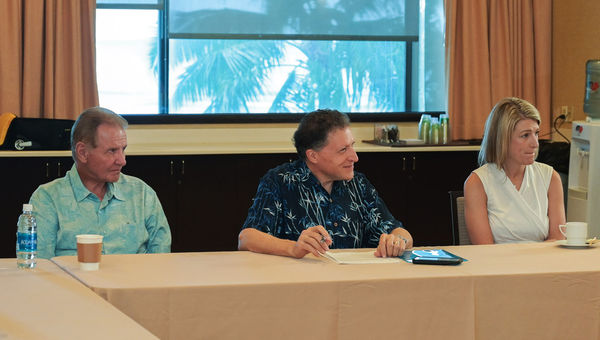
Jack Richards, Pleasant Holidays, Arnie Weissmann and Kama Winters. Photo Credit: David Miyamoto
Weissmann: A couple of you have mentioned that consumers have a lot of choice and that you're in a very competitive situation. What are other destinations doing in marketing, and what is effective?
Anderson: Look at what Dubai has done. We're in a country that has been very sensitive to what's happened for the last 20 years in the Middle East, and yet they've sprung up and they built something really incredible. And none of it is inexpensive.
Snisky: Lead with what makes you unique and reinforce that message. For Hawaii, it's not about the size of the pools; it's about the beauty of the area and the Aloha spirit. There's more being put on the falloff with the Maui wildfires than is deserved. Oahu being down double-digits isn't because of the Maui wildfires. There are other issues.
Talwar: The slowdown here actually started before the wildfires. About two months prior.
Weissmann: With Dubai, it's not historical. They're not trying to sell the essence of Dubai; the essence of Dubai now is Formula One, nightclubs, the tallest building in the world. That isn't going to happen and shouldn't happen in Hawaii. Is there a way to cast the natural attractions, the culture and the beauty that makes it exciting enough to compete with these other destinations?
Genung: It's one thing for a tourism board to say, "We want you back." It's a different thing to collectively have people say, "We want you back." That's something I've never seen on social media. Hearing from some of the people who were impacted, I think, could be very big.
Mannis: The only way we thought we could talk about this was in the voice of the employees of Hawaiian Airlines who live on Maui and were affected. And we tried to do that in a really authentic way and use those voices, because they were the only people we felt could credibly send that welcome message. And I think that the Makaukau campaign that [the HTA] is doing has a similar tone to it.
Weissmann: Most tourism to Hawaii comes from west of the Rockies. Do you think that marketing more east of the Rockies would make a significant difference?
Melissa Krueger, CEO, Classic Vacations: I think we should be marketing across the states. Do I think that the western part is still important? I do. I think there are a lot of viable markets out there.
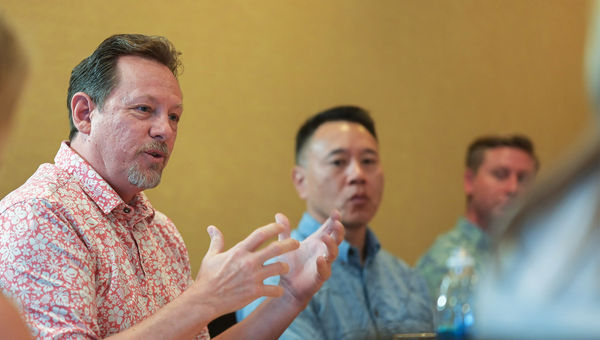
Mark Stubbert, Ensemble; Daniel Nahoopii, Hawaii Tourism Authority; and Jeff Anderson, Avoya Travel. Photo Credit: David Miyamoto
Weissmann: In the last two Hawaii roundtables, the Malama program was a dominant theme, and now my understanding is that it's no longer an official marketing push. So what replaces it that is going to be attractive and benefits communities?
Nahoopii: It hasn't disappeared. It has become a foundational value. That whole regenerative tourism idea is to identify areas where the community and local businesses and community organizations want us to tell stories and can benefit from it. It's about featuring the kinds of products that align with Malama without just talking about Malama.
Dee: We put a resident-sentiment survey in place years ago, so we track what residents think about the industry. It's actually stabilized the last couple of years and, in fact, is going in the right direction. And I think one of the reasons is, we put this thing called the Destination Management Action Plan in place, and that's been led by HTA, and it's done on a county basis.
I think Jack hit it on the head [at the Leadership Forum] when he said the elephant in the room has been the explosion of illegal short-term vacation rentals.
Winters: One of the anecdotal observations I had while spending a week on Maui was, I would say 75%-plus of the people I talked to spent part of their trip at an Airbnb, because of the cost. It can be $1,000 to $1,500 a night at certain hotels plus the resort fee, plus the valet parking fee.
If you want to get out on the islands, it feels extreme to pay those prices and then still be able to go explore it. So, their thought was, I'm going to go spend $500 bucks a night at an Airbnb, and I'm going to be able to explore and then I'm going to come to the resort and I'm going to enjoy the property.
And the other theme that I heard from people who have been coming here year after year was that this year felt like an extreme price jump in a lot of areas.
Mannis: Absolutely, clearly, [vacation rentals are] having an impact both on housing and housing inventory for communities. It's got to be fixed. I do think many consumers want the vacation rental kind of experience. I think we've got to think, from a destination perspective, around how we build that into our mix of inventory for the long term in a way that is sustainable, doesn't affect the communities and creates an alternative.